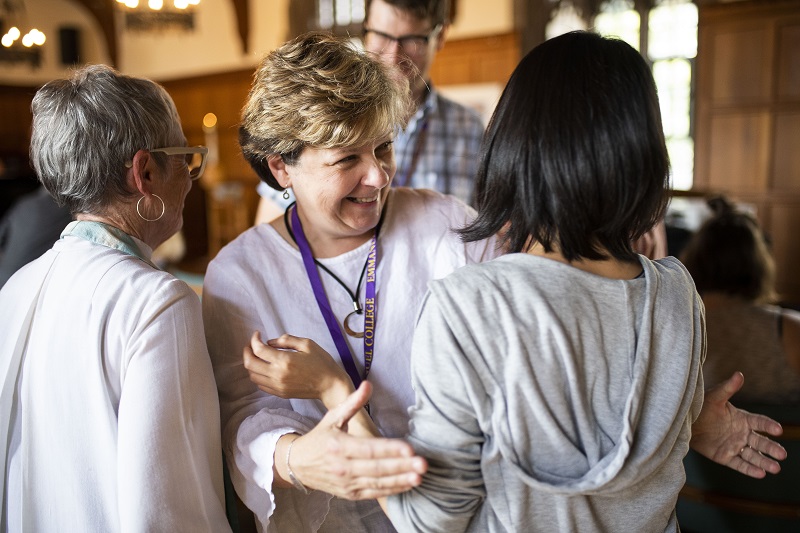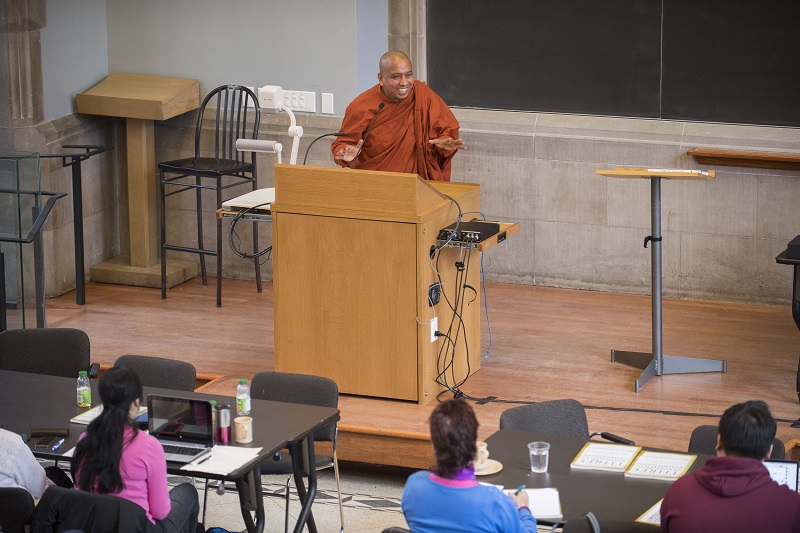Equipping Interreligious Spiritual Leaders
Starting Sept. 2024, the Master of Pastoral Studies will be called the Master of Psychospiritual Studies.
The MPS program equips individuals with the skills to make a difference in their community, developing knowledge in the areas of ethics, spirituality, faith and inter-religious dialogue. It prepares individuals for competent leadership in their chosen area of specialization.
An MPS degree from Emmanuel College provides the theological and spiritual grounding necessary to become wiser and more effective spiritual leaders.
The Master of Psychospiritual Studies (MPS) is a professional and terminal degree, which means it does not directly lead toward doctoral studies.
Program summary
The Master of Psychospiritual Studies (MPS) program consists of 20 courses across Levels 1 and 2, featuring:
- Emmanuel College core courses
- Designated electives
- Open electives
Flexible completion options:
- Full-time: complete the program in as little as 2 years.
- Part-time: take up to 8 years to finish, allowing for a balance between studies and other commitments.
This is primarily an in-person program, with up to 6 of the 20 credits eligible for online completion. Experience the depth and connection of face-to-face learning while benefiting from limited online flexibility.
Program Streams
Spiritual Care Stream
This stream prepares students who wish to provide spiritual care and counselling in religious communities or public institutions. Graduates of the MPS who complete basic units in Supervised Psychospiritual Education (SPE) are in compliance with the criteria for associate membership with the Canadian Association for Spiritual Care (CASC). Those with advanced SPE units may also meet Certified Spiritual Care Practitioners and Certified Psycho-Spiritual Therapist certification requirements with CASC.
Spiritual Care Stream: MPS, Certificate in Spiritual Care & Psychotherapy (SCP)
Students admitted to the MPS: Spiritual Care stream may choose to apply for the Certificate in Spiritual Care and Psychotherapy (SCP). This certificate provides specialized training for careers in spiritual care and psychotherapy, such as serving as a spiritual care practitioner (chaplain) in public institutions like hospitals and prisons, or as a psycho-spiritual therapist (pastoral counselor) in counseling centers and similar contexts.
This program equips students for advanced training toward Specialist certification with the Canadian Association for Spiritual Care (CASC) and is recognized as an educational training pathway for qualifying membership with the College of Registered Psychotherapists of Ontario (CRPO). Students are strongly encouraged to review the regulations in the province where they intend to practice psychotherapy and spiritual care.
Admission and Registration Requirements
- Pre-requisites: Students in the MPS: Spiritual Care Stream must first complete five courses and secure their Supervised Psychospiritual Education (SPE) Placement before applying to add the Certificate in Spiritual Care and Psychotherapy.
- Admission to the Certificate stream is competitive, with limited spaces available. Meeting the minimum requirements does not guarantee acceptance.
- Students not enrolled in the Certificate stream may still independently apply for registration with the CRPO.
About the Certificate
The Certificate is integrated within the MPS: Spiritual Care stream and is not a standalone program. It is not issued as a physical document but appears as a notation on the student's academic transcript. This notation verifies to the CRPO that the educational requirements for psychotherapist registration have been met.
Social Service Stream
This stream equips students with comprehensive leadership training tailored for roles in religious organizations, faith-based initiatives, and secular social service agencies. It prepares graduates to lead effectively in diverse settings, including community outreach programs, non-profit organizations, and public institutions, fostering meaningful contributions to society through compassionate and informed leadership.
Faith Focus
Christian

The Christian Focus is available in these streams: Spiritual Care, Social Service
Foundational Faith Courses Include:
- Old Testament I
- New Testament I
- History of Christianity I
- Theology I
- Christian Ethics in Context
Muslim

The Muslim Focus is available in the Spiritual Care stream and the Social Service Stream.
Foundational Faith Courses Include:
- Qur’an 1
- Islamic Thought: 7-13 C
- Sufism – Islamic Spirituality
- Biography and Thought: Muhammad
- History of Islamic Thought in the Modern Age
- Intertwined Texts: Bible and Qur’an in Dialogue
Buddhist

The Buddhist focus is offered in the Spiritual Care stream.
Foundational Faith Courses Include:
- History of Buddhist Traditions
- Foundational Tenets and Practices of Buddhism
- Buddhist Meditative Traditions
- Classic Buddhist Texts
- Buddhist Ethics
- Buddhist Contemplative Care
Master of Psychospiritual Studies: Spiritual Care Program Overview
Level 1: Foundational Core Courses
|
Buddhist Focus |
Christian Focus |
Muslim Focus |
|
¨ EMP 1621H Multi-Religious Theological Education and Leadership |
||
|
¨ EMP 1513H Introduction to Counselling and Spiritual Care |
||
|
Choose five Buddhist Faith Foundation courses |
|
Choose four Muslim Faith Foundation courses |
|
¨ EMT 1620H Hist of Buddhist Trads ¨ EMT 2629H Classic Buddhist Texts ¨ EMT 1631H Foundational Tenets and Practices of Buddhism ¨ EMP 2011H Buddhist Contemplative Care ¨ EMP 2671H Buddhist Meditative Traditions ¨ EMT 2630H Buddhist Ethics |
¨ EMB 1003H Old Testament 1 |
¨ EMB 1901H Qur’an 1 (Formerly EMT 1851H Surat al-Baqara (Qur’an 1)) ¨ EMH 1081H Islamic Thought: 7-13 C (Formerly EMT 3607 Islamic Thought: Classical Age) ¨ EMT 2610H Sufism – Islamic Spirituality (Formerly EMT 3610 Religious Thought and Spirituality in Islam) ¨ EMT 3101H Biography and Thought: Muhammad ¨ EMT 3608H History of Islamic Thought in the Modern Age ¨ EMB 3020H Intertwined Texts: Bible and Qur’an in Dialogue |
|
¨ EMB 1501H |
||
|
¨ XXH 1010H History of Christianity 1 |
||
|
¨ EMT 1101H Theology 1 |
||
|
|
||
|
¨ EMT 2630H Buddhist Ethics |
¨ EMT 2902H Christian Ethics in Context |
¨ EMT 3873H Law, Ethics |
Level 2: Core Courses
|
Buddhist Focus |
Christian Focus |
Muslim Focus |
|
¨ EMF 3020HY Contextual Education (one credit) AND ¨ Open Elective (one credit) OR ¨ TSP/EMP 355xYY Supervised Psychospiritual Education Basic Unit 1 |
||
|
¨ EMP 3521H Professional Ethics for Spiritual Care and Psychospiritual Therapy |
||
|
¨ Capstone Course – EMP 3541H Integrating Theory and Practice |
||
Designated Elective Courses
|
Buddhist Focus |
Christian Focus |
Muslim Focus |
|
¨ Coloniality and Power Any specifically designated courses that variously engage in diverse dimensions of power and privilege, coloniality, and Indigenous relations and experiences, including in relation to the Canadian context. |
||
|
¨ Life Stage Spiritual Care Any 2000 or 3000 level course in spiritual care related to life stages and theories of human growth (e.g., youth ministry, death and dying) |
||
|
¨ Spiritual Care, Counselling, and Mental Health Any 2000 or 3000 level course in spiritual care or counselling |
||
|
¨ Spiritual Care, Counselling, and Mental Health |
|
|
|
¨ Religious Diversity and Pluralism A 1000 to 3000 level course on a religious tradition other than the one(s) with which the student identifies, or one that addresses the topic of religious pluralism and/or challenges related to an intercultural and interfaith global context. |
See above EMB 3020H |
|
|
¨ Buddhist Spirituality |
¨ Christian Spirituality |
See above EMT 3610H |
|
¨ Three Open Electives |
¨ Three Open Electives |
¨ Four Open Electives |
Learning Outcomes
Learning Outcomes
Upon completion of the Master of Psychospiritual Studies program one will be able to demonstrate:
- Knowledge of sacred texts, religious history, religious-based ethics, tenets, and thought of one or more religious tradition(s) in correlation with theories of social sciences that are relevant to professional practice.
- Evidence of sustained reflection on spiritual and professional identity formation in intercultural and interfaith contexts, in relation to specialized practice.
- Development of skills, gifts, and arts of professional practice, grounded in appropriate theories, for leadership in institutional, community and other settings.
MPS Student Spotlights
Khulood Khan

Khulood Khan is a student in the Master of Psychospiritual Care programme at Emmanuel College. She is also a teacher in the Halton School District, a professor at Georgian College and Trent University, a counsellor, a crisis responder for the Halton Regional Services and a chaplain endorsed by the Interfaith Committee on Canadian Military Chaplaincy. She is an intern at the Maplehurst Correctional Complex and provides multifaith mindfulness programming at the Grand Valley Institution for Women as a prison chaplain.
